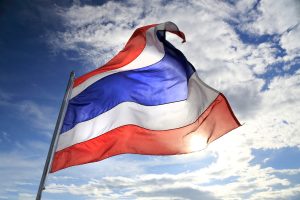The army-owned Channel 5 has long been one of the lowest rated free-to-air television channels in Thailand. Its executives have tried to boost the channel’s appeal by maintaining commitment to quality reports, collaborating with outspoken news personalities, joining hands with international partners, and even launching a TV shopping platform to promote SME products. Channel 5 has finally been thrust into the forefront of public interest following the revelation that it has entered into some kind of information sharing agreements with the state-affiliated media of China, Iran, and Russia – the so-called “axis of authoritarianism.”
Channel 5’s cooperation with Russia, in particular, has been closely monitored for several reasons. First, it came amid a critical phase of the war in Ukraine, labelled by the Russian side as the completion of Russia’s “first phase of military operation.” Simultaneously, a Moscow court banned Meta-owned platforms, Facebook and Instagram, under Russia’s “extremism” law. Second, the private media company Top News which provides content to Channel 5 has already been perceived as pro-Russia for airing false video footage and suggesting that Ukrainians have faked casualties. Third, Channel 5 director Gen. Rangsee Kitiyanasap, who has recently stepped down from his position, personally met with the Russian ambassador to Thailand to explore information sharing options.
Rangsee insisted that his moves were non-political and were merely intended to broaden news sources in order to present balanced news coverage. Thai audiences, he said, should have access to information from all sides, not just relying on Western sources, and make their own judgment about what is real or fake. Channel 5’s initiatives have indeed gained approvals, or even compliments, from a significant number of observers, especially conservatives, who have criticized the Western media’s explicit bias in the Ukraine war coverage.
Still, many argue that Channel 5 has crossed the line. The channel is, after all, generally considered as a megaphone for the Thai military elites rather than a media outlet. Hence, there is the danger that Rangsee’s words and meeting with the Russian ambassador will be interpreted as the Thai military-backed government’s abandonment of neutrality in favor of Russia.
To be fair, Rangsee and his team also met with the Ukrainian Charge d’Affaires to Thailand, Oleksandr Lysak, to discuss information exchanges. Nevertheless, some speculate that the meeting was arranged at the last minute to deflect criticisms. Certainly, from a business lens, there was no need to include Ukraine as a media partner considering that Ukrainian narratives will essentially be the same as the ones presented by Western media. From a diplomatic standpoint, however, excluding Ukraine was a no-go.
Lysak’s relative quietness compared to the Russian ambassador, Evgeny Tomikhin, may have further contributed to the lack of public attention to Channel 5’s meeting with Ukrainian envoys. Ambassador Tomikhin has been carefully laying the groundwork for winning the sympathies of Thais. He published a Bangkok Post article within two days of Russia’s full-scale attack on Ukraine to present the Russian version of the story and encourage readers to “study the problem with open-mindedness.” Again, during the March 15 press conference, ambassador Tomikhin showered Thailand with praise, saying that he appreciates the Thai government’s assertion of neutrality despite being subjected to intense Western pressure and that Russia bears no grudge against Thailand’s decision to back the United Nations resolution condemning Russian actions.
In any case, Thailand’s Prime Minister Prayut Chan-o-cha and some military higher-ups are clearly concerned about sending the wrong signals to the United States and other liberal democracies, to the point that they decided to blatantly silence voices from their own channel. Channel 5’s Ukraine war coverage on March 28 was mysteriously interrupted by “technical difficulties.” Rangsee’s “resignation” also happened abruptly and abnormally.
Prayut denied any involvement in Rangsee’s withdrawal, but warned the media to stop making “excessive analysis” of the war that “belongs to another region.” Reading too much into the war, as the prime minister stressed, will “cause problems” for Thailand. To a degree, this underscores a subtle shift in Thailand’s foreign policy conduct. While maintaining its neutrality, Thailand has long sought to take advantage of its cordial relations with all great powers to play an honest broker role. But now, it appears that the ruling Thai elites think the most practical approach to weather the global geopolitical storm is to stand above the fray entirely.
Needless to say, as the world is witnessing the emergence of a multipolar world order, international news reports made by the Thai state and non-state media outlets alike will be heavily scrutinized and edited by the Thai government to safeguard the country’s national interests. The space of media freedom will inevitably shrink further.

































